Greetings, Agents of Impact!
Featured: ImpactAlpha Original
Impact investors step up to the migration challenge in Central America. The confluence in Central America of extreme weather events, gang violence, corruption and poverty – exacerbated by COVID – is causing a wave of migration from people in the region seeking opportunity and stability in Mexico and the U.S. If the crises are not new, the U.S. response represents a marked shift. The Biden administration has pledged itself to a multi-billion dollar plan to fight corruption, boost the role of women and small businesses in inclusive growth, and mobilize private capital. As part of USAID’s Guatemala Entrepreneurship and Development Innovation initiative, companies and private sector partners have committed $31 million to support entrepreneurs and businesses that can increase access to renewable energy and improve agriculture, water and sanitation, health, and education. The partners include Starbucks, Target Foundation, PriceMart and Argidius Foundation, along with Alterna, Pomona Impact and Root Capital. USAID will provide an additional $7.5 million in funding to the Aspen Network of Development Entrepreneurs to work with its dozens of member incubators, accelerators and financial institutions in the region to provide direct support and capital to farmers, entrepreneurs and business owners.
“The U.S.-led commitment to tackling the myriad of root causes of migration is exactly what’s needed,” says Willy Foote of Root Capital, a lender to farmer cooperatives, agri-processors and other businesses that serve smallholder farmers. Foote was in Guatemala with USAID’s Samantha Power for last month’s launch of the initiative. The shift in approaches to the region could mean a larger role for impact investment models that have been incubated over decades to create good jobs and opportunity in the face of climate and economic disruptions. Investors of patient capital in frontier markets “really build capacity and create social enterprises that are investment-ready,” says Tim Docking of the Refugee Investment Network, which aggregates investable solutions to global forced migration. Root, an early ANDE member, made its first agricultural loan in Guatemala more than 20 years ago and has since lent roughly $500 million in Central America. “Being able to build bottom-up with businesses that are embedded and proximate to frontline communities is absolutely critical,” says Foote. “People don’t want to go if they don’t have to.”
Keep reading, “Impact investors step up to the migration challenge in Central America,” by Dennis Price on ImpactAlpha.
Dealflow: Housing Equity
Enterprise Community Partners closes $229 million affordable and workforce housing equity fund. Investors in the Enterprise Preservation Fund include major banks, family offices, life insurance companies and foundations, Enterprise’s Chris Herrmann told ImpactAlpha. The fund is seeking to acquire and preserve $800 million in existing affordable and workforce rental housing, or more than 7,500 units, over two years. The fund has made 10 investments, totaling about 3,000 units, in Columbia, S.C. and Newark, Del., Cleveland, Chicago, Houston and Seattle. “There are affordability challenges everywhere. It’s not limited to only the high-cost markets like New York and San Francisco,” said Herrmann. ”The products we’ve found and invested in those markets are properties that are really on the cusp of losing that affordability and displacing families.”
- Racial equity in housing. The equity fund supplements Enterprise’s Equitable Path Forward Initiative, a five-year plan to catalyze $3.5 billion to diversify the real estate industry and create affordable rental housing in Black, Indigenous and other minority communities (see, “Netflix invests $25 million in Enterprise’s Equitable Path Forward”). Enterprise will invest in, and with, developers and rental housing services providers of color to help them grow their businesses.
- Share this post.
Turntide secures $225 million to make electrical motors more efficient. The Sunnyvale, Calif.-based company makes energy-efficient “smart” motors for transportation, agriculture, commercial buildings and shipping. The goal: accelerating the low-carbon transition by eliminating the “25% of electricity consumption that is wasted by legacy electric motors.” Backers of the convertible note include the Canada Pension Plan Investment Board, Monashee Investment Management and the venture fund of commercial real estate services firm JLL. The company has raised more than $400 million in total from investors including Breakthrough Energy Ventures, Amazon’s Climate Pledge Fund, Robert Downey Jr.’s Footprint Coalition and BMW’s venture fund.
- Buildings and transport. Turntide will use the fresh capital to build out its electric vehicle transport business. The company has acquired U.K.-based AVID Technology, which designs and manufactures powertrain components for heavy duty electric and hybrid vehicles. Last month, it acquired Hyperdrive, also in the U.K., which makes lithium-ion battery systems.
- EV efficiency. Separately, Boston-based Electra Vehicles raised $3.6 million for a software system that aims to improve battery performance in electric vehicles. The investment is the first from the IVY Innovation Fund of BlackBerry, the legacy phone maker. BlackBerry’s edge computing software helps Electra provide “responsive battery management,” the company said.
- Check it out.
Workforce housing in Indianapolis demonstrates Opportunity Zone impact. More than 90% of the 188 units at The Westmont property in Indianapolis will go to low-income residents. The $31 million workforce housing project is built on a cleaned-up brownfield site and is creating local jobs that pay $20 per hour. A $3 million equity investment in the project is the tenth from a $22 million partnership between Texas-based Woodforest National Bank and social impact-focused real estate fund manager CEI-Boulos Capital Management. The partners’ Opportunity Zone fund invested in the project “because it was able to provide much needed affordable housing and workforce housing, and also revitalize a site that had significant environmental issues historically,” Woodforest’s Noelle St. Clair told ImpactAlpha. A local nonprofit, EmployINDY, is helping train and hire nearby residents for the project.
- Place-based. The Woodforest CEI-Boulos Opportunity Zone fund aims to provide equity financing for high-impact OZ projects across the 17 U.S. states where Woodforest has local bank branches. The vehicle targets investments using the Opportunity Zone reporting framework from Georgetown University’s Beeck Center and the U.S. Impact Investing Alliance (see, “How and why to measure the impact of investments in Opportunity Zones”). “That framework really informs how we approach everything we do through our fund,” St. Clair says.
- Dig in.
Dealflow overflow. Other investment news crossing our desks:
- The Gates Foundation announces a $2.1 billion commitment to women’s economic advancement at U.N. Women’s Gender Equality Forum (see, “Gates Foundation to focus on climate change and gender equality“).
- Woman-led FutureProof scores $3 million for its property-level climate risk assessment platform.
- Nigeria’s MDaaS Global closes $2.3 million in early funding to expand accessible and affordable health diagnostic services.
Signals: Ahead of the Curve
Big banks take on the challenge of accounting for their impact. The race is on to define the standards of corporate value – and the accounting rules of the new stakeholder economy. The goal: a measure of value that takes natural and human capital into account alongside financial capital. Banking for Impact, which includes UBS, ABN AMRO and Harvard University, is working to deploy by next year a framework that will quantify, value, attribute and aggregate financial institutions’ material impacts. The common impact measurement and valuation system for the sector builds on initiatives such as Harvard’s impact-weighted accounts project (see, “Weighting accounts for impact”) to help banks quantify their impacts, positive and negative, and translate them into the lingua franca of finance. Other members of Banking for Impact include Denmark’s Danske Bank, Singapore’s DBS Bank, and the Impact Institute. “Financial institutions are in a unique position to establish themselves as the drivers of the transition to an impact economy,” the group writes in a new “vision paper.”
- Externalities. How do you quantify employee well-being or healthy communities? How much of a coal company’s greenhouse gas emissions is the responsibility of the bank that loaned it money? The nuts and bolts of devising new accounting systems are complex. Banking for Impact says other sustainability reporting initiatives aren’t designed to assess the full range of value-creation across the banking value chain. The banks plan to consult with the Principles for Responsible Banking group and others “to make the vision of an impact economy, promoted by financial institutions, a reality.”
- Share this post
Agents of Impact: Follow the Talent
Dutch development bank FMO hires Michael Jongeneel, ex- of Bain & Company, as chief executive officer… Domini Impact Investments has openings for a senior research associate and a senior marketing and shareholder communications associate in New York… Pacific Community Ventures is hiring a lending portfolio director, a marketing associate and a people and culture manager in Oakland… Impact Frontiers seeks an investor engagement manager in Boston… Also in Boston, Fidelity Foundations is hiring a senior evaluation and impact officer.
Impact Capital Managers is recruiting an analyst in New York… Opportunity Alabama is looking for a manager of grant writing… The U.S. Small Business Administration is soliciting nominations to serve on its reconvened Council on Underserved Communities… The Predistribution Initiative is hosting a discussion with Oxford’s Saïd Business School’s Aunnie Patton Power on regenerative financing opportunities, Wednesday, July 14.
Thank you for your impact.
– July 1, 2021











